Відбувся черговий захід в межах проєкту «Міста взаємності: інтеграція через міжкультурний діалог».
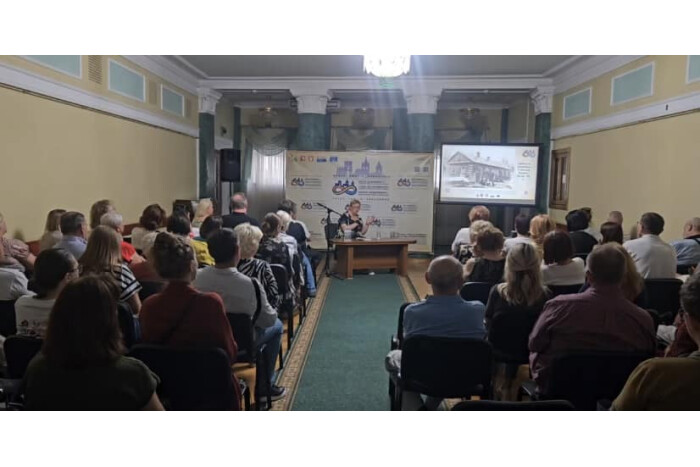
Палац культури міста Луцька зібрав близько 80 слухачів - освітян, діячів культури, викладачів, представників національних спільнот, громадських організацій та нових мешканців Луцька, на публічну лекцію «Чехи на Волині», що є частиною освітнього заходу «Луцьк багатоголосий: мова, історія і традиції спільнот Луцька».
Захід відкрила керівниця проєкту, директорка департаменту культури Луцької міської ради, локальна координаторка Програми Ради Європи «Інтеркультурні міста» Тетяна Гнатів, яка наголосила, що Луцьк - місто з особливою інтеркультурною аурою, місто діалогу, поваги й взаємності, місто, яке промовляє багатьма голосами.
Лекторка Світлана Шульга, докторка історичних наук, професорка ВНУ імені Лесі Українки, провела слухачів крізь сторінки історії чеської спільноти на Волині: від перших поселень у XVIII–XIX століттях до драматичних подій двох світових воєн та післявоєнного періоду.
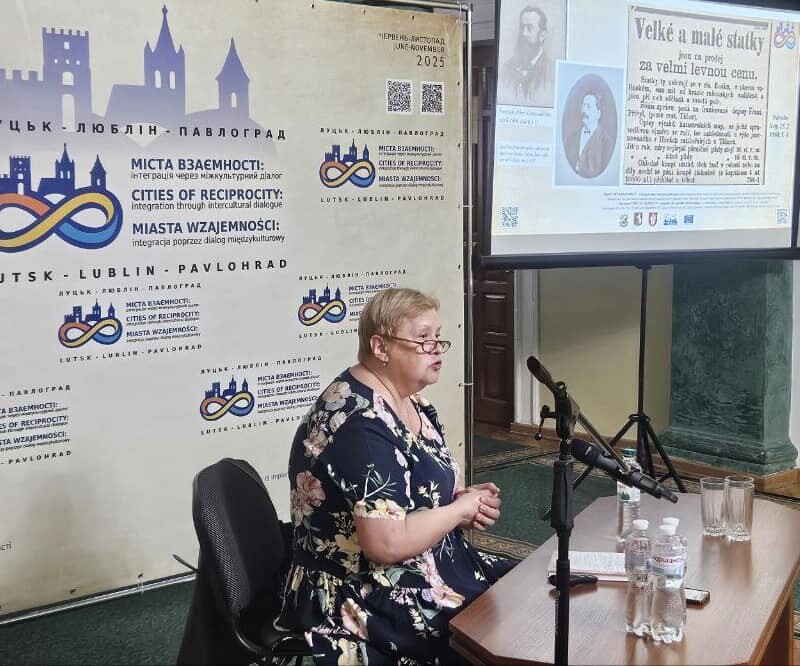
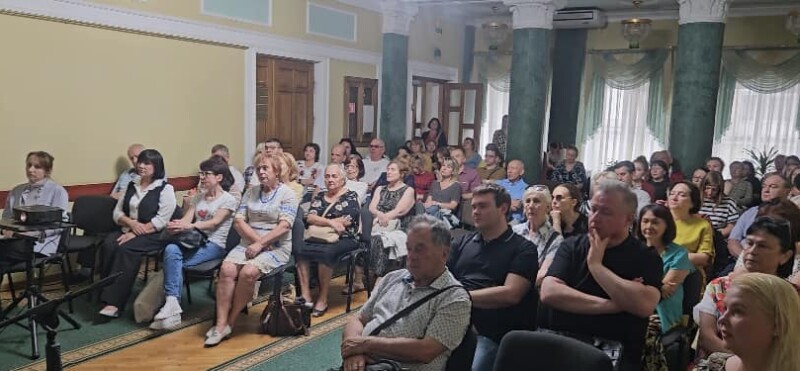
Особливу увагу пані Світлана приділила історії луцьких чехів — їхньому життю, підприємництву, побуту та внеску в розвиток міста. Слухачі мали можливість поспілкуватися з нащадком давнього роду Гофманів, яка була серед присутніх.
Живий інтерес до теми засвідчили й запитання до лекторки — обговорення вийшло щирим і глибоким.
Підсумовуючи зустріч, Тетяна Гнатів подякувала учасникам за зацікавленість історією громади, та підкреслила, що наша сила в єдності, людяності та взаємності, і ми разом творимо спільне майбутнє для себе, своїх дітей та країни.
Чекаємо на наступній лекції в серпні, де говоритимемо про караїмів Луцька.
Захід організовано в межах проєкту «Міста взаємності: інтеграція через міжкультурний діалог», який реалізує Департамент культури Луцької міської ради у партнерстві з містами Люблін (Республіка Польща) та Павлоград (Україна), за підтримки Програми Ради Європи «Інтеркультурні міста» (ICC) та фінансується Радою Європи.
Цей допис було підготовлено за фінансової підтримки Ради Європи. Погляди, висловлені в ньому, жодним чином не можуть тлумачитися як такі, що відображають офіційну позицію Ради Європи.
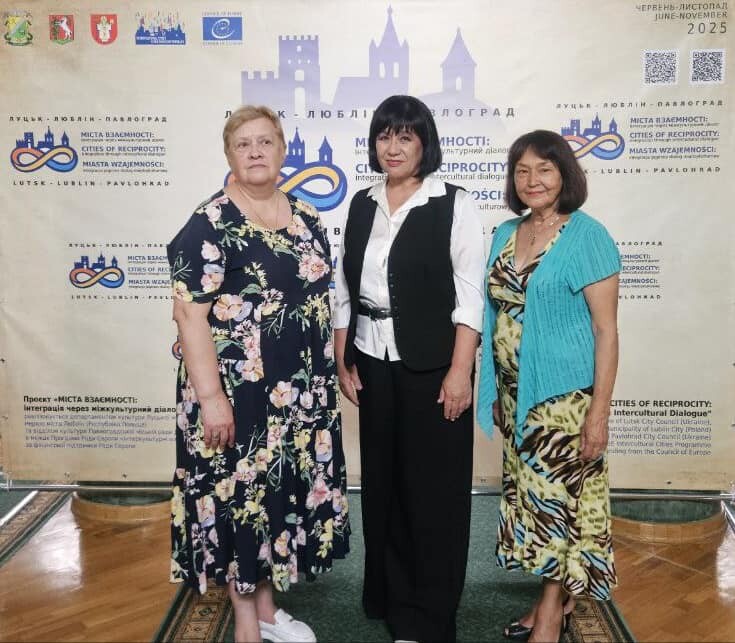
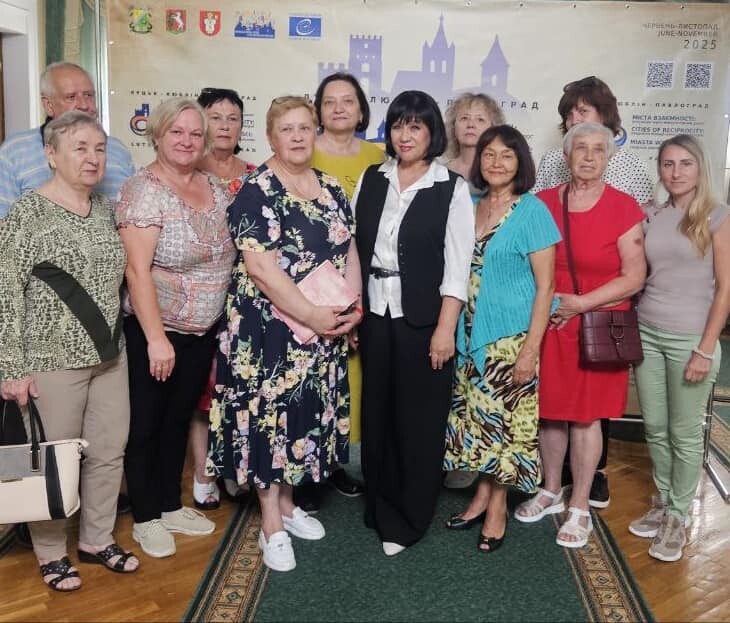
Yesterday, the Lutsk City Palace of Culture brought together around 80 attendees — educators, cultural figures, university professors, representatives of national communities, civil society organizations, and new residents of Lutsk — for a public lecture entitled “Czechs in Volyn”, held as part of the educational series “Polyphonic Lutsk: Language, History, and Traditions of Lutsk’s Communities”.
The event was opened by Tetiana Hnativ, Head of the Project, Director of Department for Culture of Lutsk City Council, and Local Coordinator of the Council of Europe’s Intercultural Cities Programme. In her welcoming speech, she emphasized:
“Lutsk is a city with a unique intercultural atmosphere — a city of dialogue, respect, and reciprocity. A city that speaks with many voices. And today, the first of these voices we will hear is the Czech one.”
The lecture was delivered by Svitlana Shulha, Doctor of Historical Sciences and Professor at Lesya Ukrainka Volyn National University. She guided participants through the history of the Czech community in Volyn — from their first settlements in the 18th–19th centuries, through the dramatic events of the two World Wars, and into the post-war period.
Particular attention was given to the story of Lutsk’s Czech national community — their everyday life, business activities, cultural contributions, and legacy within the city. The audience even had the opportunity to meet a descendant of the historic Hoffmann family, who was among the participants.
The keen interest of the audience was reflected in the thoughtful questions posed to the speaker, making the discussion lively and engaging.
Concluding the meeting, Tetiana Hnativ remarked: “The main takeaway from today’s event is this — we may be different, but we are together. We are Ukrainians. Our strength lies in unity, and our greatest value — in humanity and mutual respect. We stand side by side for victory and for the common future we are building together — for ourselves, for our children, and for Ukraine.”
We sincerely thank everyone who joined us! We look forward to seeing you at our next lecture on August 27 — where we will explore the history of the Karaim community of Lutsk.
The event is part of the project “Cities of Reciprocity: Integration through Intercultural Dialogue”, implemented by the Department of Culture of Lutsk City Council in partnership with the cities of Lublin (Republic of Poland) and Pavlohrad (Ukraine), with the support of the Council of Europe’s Intercultural Cities Programme (ICC) and with funding from the Council of Europe.
This post has been produced with the financial assistance of the Council of Europe. The views expressed herein can in no way be taken to reflect the official opinion of the Council of Europe.
Департамент культури міської ради
